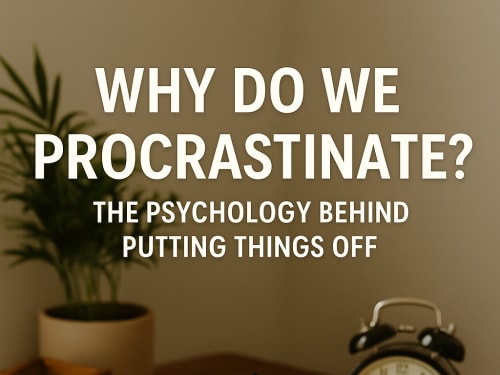Why Do We Procrastinate? The Psychology Behind Putting Things Off

posted 14th October 2025
🧩 Why Do We Procrastinate? The Psychology Behind Putting Things Off
We’ve all been there, staring at a deadline, promising ourselves “I’ll start in five minutes,” and suddenly it’s 11 p.m. and nothing’s been done. Procrastination isn’t just about being lazy or unmotivated; it’s something much deeper.
Psychologists say it’s a battle between emotion and logic, where our brains choose temporary comfort over long-term success. But why do we do it, even when we know it’ll make us more stressed later? Let’s unpack what’s really going on in your mind when you put things off, and how to break the cycle.

🧠 The Psychology Behind Procrastination
Procrastination isn’t about poor time management — it’s about emotion regulation. When faced with a task that feels overwhelming, boring, or stressful, your brain chooses to protect you from discomfort. Instead of tackling the task, it seeks instant relief through distractions like scrolling, snacking, or “just checking one more email.”
Psychologists link this to a tug-of-war between two brain regions
- The limbic system, which craves immediate comfort and pleasure.
- The prefrontal cortex, responsible for planning, self-control, and long-term goals.
When you procrastinate, the limbic system wins. In that moment, avoiding the task feels good, but later, guilt and stress kick in, creating a vicious cycle.
Research by psychologist Dr. Tim Pychyl shows that procrastination is really a way of avoiding negative emotions, not work itself. We don’t delay the task; we delay the feelings it brings, like anxiety, frustration, or self-doubt.
😬 Why We Procrastinate: Common Triggers
We all procrastinate for different reasons, but psychology shows a few patterns that pop up again and again.
Recognising them is the first step to breaking the habit.
⚖️ 1. Fear of Failure
When something really matters, we put pressure on ourselves to get it perfect. That fear of not doing well can be paralysing — so instead of risking failure, we avoid starting altogether. Ironically, the more important the task, the more likely we are to delay it.
🎯 2. Perfectionism
Perfectionists often procrastinate because they set impossibly high standards. They wait for the “perfect” time, mood, or conditions to start — which, of course, never come. This creates a cycle of planning, worrying, and never quite beginning.
🔋 3. Lack of Motivation or Interest
Let’s be honest — some tasks just feel boring or pointless. When our brains don’t see immediate rewards, motivation drops. That’s why things like deadlines or external accountability can help give tasks meaning and urgency.
💭 4. Overwhelm and Decision Fatigue
When a task feels huge or unclear, we freeze. Our brains don’t know where to start, so we put it off. Breaking big goals into smaller, doable steps helps reduce that mental load.

📊 The Numbers Behind Procrastination
You’re definitely not alone in putting things off; research shows procrastination is incredibly common:
- Around 20–25% of adults consider themselves chronic procrastinators, meaning it’s a consistent struggle, not just an occasional habit (Pychyl & Flett, 2012).
- Among students, it’s even higher: up to 80–95% admit to procrastinating on schoolwork regularly (Steel, 2007).
- A 2023 study found that people who procrastinate frequently report higher stress, anxiety, and lower life satisfaction, showing that procrastination isn’t just about lost time — it affects mental health too (Sirois, 2023).
- One survey even found the average person spends over 55 days a year procrastinating — that’s nearly two months lost to avoidance (StudyFinds, 2022).

💪 How to Beat Procrastination (For Real This Time)
Knowing why we procrastinate is one thing — but changing it takes a few clever mindset shifts. Here’s what really helps, according to psychology 👇
🕔 1. The 5-Minute Rule
Tell yourself you’ll just start for five minutes. That small commitment tricks your brain into getting started — and once you’ve begun, momentum often takes over. Action creates motivation, not the other way around.
🧭 2. Implementation Intentions
Psychologist Peter Gollwitzer found that people who plan when and where they’ll do a task are far more likely to follow through. Instead of “I’ll write my essay later,” try: “I’ll start my essay at 10 a.m. in the library.”
💬 3. Self-Compassion Over Self-Criticism
Beating yourself up for procrastinating actually makes it worse. Studies show that self-compassion — recognising you’re human and starting fresh — reduces guilt and helps you re-engage faster (Sirois, 2014).
🔄 4. Break It Down
Big goals are intimidating. Split them into micro-tasks — like “open the document,” “write the intro,” or “find one source.” Each small win gives your brain a dopamine boost that keeps you going.
☀️5. Reward Progress, Not Just Perfection
Celebrate small steps. Whether it’s a walk, coffee, or your favourite show — pairing rewards with effort rewires your brain to associate productivity with positive feelings.
📚 References
Pychyl, T. A., & Flett, G. L. (2012). Procrastination and self-regulatory failure: An introduction to the special issue. Journal of Rational-Emotive & Cognitive-Behavior Therapy, 30(4), 203–212. https://doi.org/10.1007/s10942-012-0149-5
Steel, P. (2007). The nature of procrastination: A meta-analytic and theoretical review of quintessential self-regulatory failure. Psychological Bulletin, 133(1), 65–94. https://doi.org/10.1037/0033-2909.133.1.65
Sirois, F. M. (2014). Out of sight, out of time? A meta–analytic investigation of procrastination and time perspective. European Journal of Personality, 28(5), 511–520. https://doi.org/10.1002/per.1947
Sirois, F. M. (2023). The health and well-being costs of procrastination: A meta-analytic and conceptual update. Personality and Individual Differences, 203, 112026. https://doi.org/10.1016/j.paid.2023.112026
Gollwitzer, P. M. (1999). Implementation intentions: Strong effects of simple plans. American Psychologist, 54(7), 493–503. https://doi.org/10.1037/0003-066X.54.7.493
StudyFinds. (2022, September 18). Average person spends 55 days a year procrastinating. Retrieved from https://studyfinds.org/



